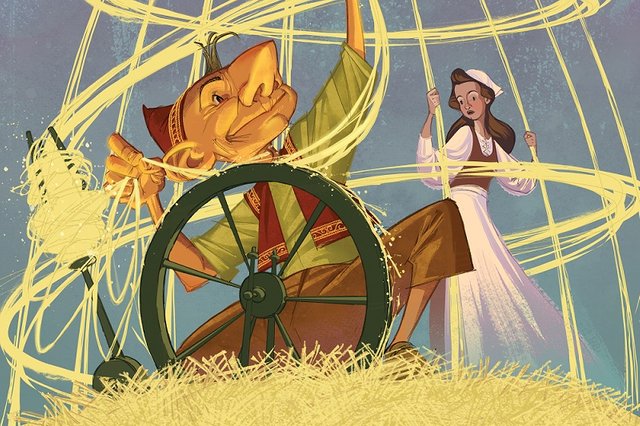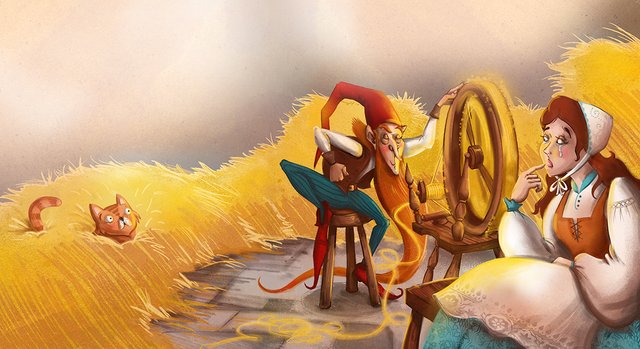Rumpelstiltskin: Fairytale or Political Fable?
Political Spin
Rumpelstiltskin is one of the many tales that form the bulk of European folklore. It was written down by the Brothers Grimm in 1812 and has many variants. In spite of these, the core of the story runs thus.
A well-to-do miller boasted that his daughter was not just the most beautiful maiden in the district, but that she could spin straw into gold.
The poor woman could do nothing of the kind, but the king got to hear about it. He had her captured, locked in a tower with a spinning wheel and a pile of straw, and told to spin gold overnight - on pain of death.
Fair Bargaining
The woman was frantic initially, and then resigned to her fate. Suddenly, an imp appeared and offered to spin gold in return for the ring she was wearing. It was a fair bargain; one that pleased the king, saved her life - and landed her another pile of straw to spin. The woman sat, resigned to her fate and prepared to die until the imp appeared again.
This time, his price was her handsome necklace. Still, the greed of the king was not appeased. The woman was ordered to spin the next roomful of straw in return for his hand in marriage. If she failed, well...
The First Born
When the imp appeared that night, the woman protested that she had nothing left with which to pay him. No worries. The imp knew of the impending marriage and asked nothing of the woman except...her first-born child. It must have been an agonising 'yes', but with death staring her in the face, the woman agreed.
The gold was spun, the wedding took place and one year down the line, the Queen gave birth to her son. She was very, very happy - until the night the imp appeared in her chamber and demanded the baby boy. The Queen pleaded and pleaded.
Then, the imp made an agreement with her.
What's my Name?
If she could guess his, the imp's, name before three nights were up, the child would be hers to keep. She consulted every book of names in the kingdom before a messenger, a man to whom she had once done a kindness, told her that he had seen a little man dancing in a barn boasting that the Queen's child would soon be his, and that no-one would ever guess his name to be Rumpelstiltskin.
When the Queen revealed the name to the imp, he ran away angrily and never came back. And they all lived happily ever after? There are many elements in this tale that I have never understood.
Virtue Rewarded?
In the majority of folk and fairy tales, there is a clear link between virtue, effort and reward. In Rumpelstiltskin, reward seems to accrue to the greedy and arrogant. Not all elements of the story are quite fictional. For starters, there is nothing remarkable about a monarch holding captive a seeming practitioner of alchemy.
Throughout the Middle Ages and into the Renaissance, there was a demand for 'good' alchemists among European nobility. Such was it that, in the seventeenth century, a Scottish alchemist named Alexander Seton was taken captive and tortured by the Elector of Saxony.
Eventually, he escaped with the help of a friend.
The Motives
In the story, there is no doubting the motives of the King, or the miller. More puzzling is the motivation of Rumpelstiltskin. He could not have wanted wealth; he was able to make that for himself. His plying for the Queen's ring and necklace was mere tokenism, to see if she could be 'bought'.
If he just wanted a child, any child, he was gifted enough to steal one without conspiring with her or anyone else. No, he wanted a newly-born royal child, placed freely - if reluctantly - into his arms. Why?
His Dark Purpose
Even today, advanced societies believe in the power of 'blood', that a ruler or head of state should belong to a particular family. In German, the name Rumpelstiltskin means 'rattle ghost', similar to a poltergeist or playful ghost. The imp was a kind of earth spirit with the power to create mineral wealth.
However, he wanted a human child of royal blood for a particular purpose, most likely to create a subverted race and a challenge to humanity.
The Power of the Name
The scene where the Queen reveals his name is another puzzle. Rumpelstiltskin could have let on that she had gotten it wrong. Obviously, there was magic inherent in the very utterance of his name. Interesting, too, that he is the only named character in the story.
In spite of his chicanery, I always feel sorry for Rumpelstiltskin's loss. He didn't do anything really wicked in the story, only play greedy, arrogant humans against one another.
After all, the King makes off with a royal flush; sacks of gold, lovely Queen, and son and heir. It has always been thus.
Source:
Black Thorn, White Rose: A Modern Book of Adult Fairy-Tales




You have been upvoted by the @sndbox-alpha! Our curation team is currently formed by @jeffbernst, @bitrocker2020, @jrswab & @teachblogger . We are seeking posts of the highest quality and we deem your endeavour as one of them. If you want to get to know more, feel free to check our blog.